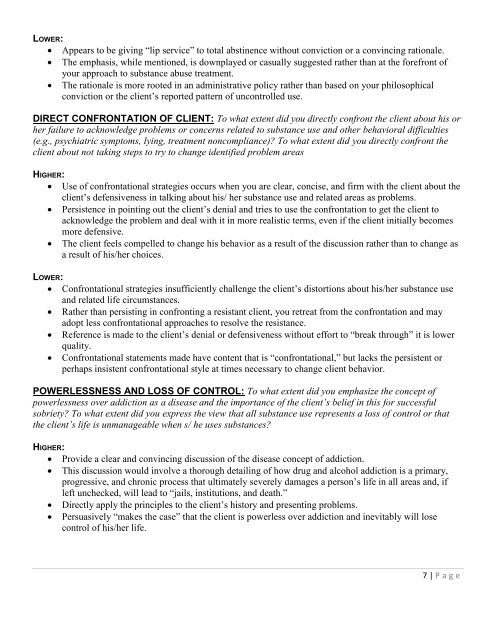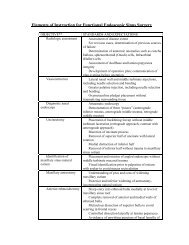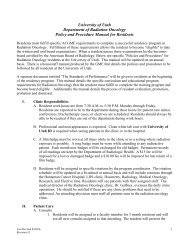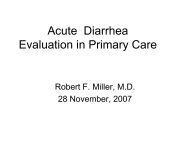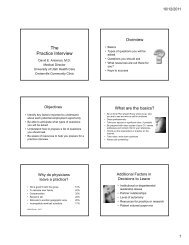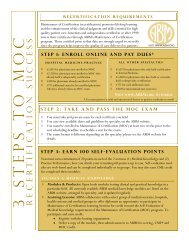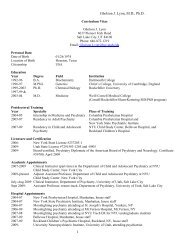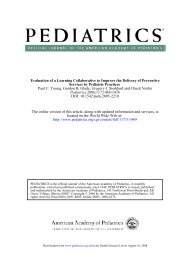Motivational Interviewing Ratings: Higher and Lower Skill Levels
Motivational Interviewing Ratings: Higher and Lower Skill Levels
Motivational Interviewing Ratings: Higher and Lower Skill Levels
You also want an ePaper? Increase the reach of your titles
YUMPU automatically turns print PDFs into web optimized ePapers that Google loves.
LOWER:<br />
Appears to be giving “lip service” to total abstinence without conviction or a convincing rationale.<br />
The emphasis, while mentioned, is downplayed or casually suggested rather than at the forefront of<br />
your approach to substance abuse treatment.<br />
The rationale is more rooted in an administrative policy rather than based on your philosophical<br />
conviction or the client’s reported pattern of uncontrolled use.<br />
DIRECT CONFRONTATION OF CLIENT: To what extent did you directly confront the client about his or<br />
her failure to acknowledge problems or concerns related to substance use <strong>and</strong> other behavioral difficulties<br />
(e.g., psychiatric symptoms, lying, treatment noncompliance)? To what extent did you directly confront the<br />
client about not taking steps to try to change identified problem areas<br />
HIGHER:<br />
Use of confrontational strategies occurs when you are clear, concise, <strong>and</strong> firm with the client about the<br />
client’s defensiveness in talking about his/ her substance use <strong>and</strong> related areas as problems.<br />
Persistence in pointing out the client’s denial <strong>and</strong> tries to use the confrontation to get the client to<br />
acknowledge the problem <strong>and</strong> deal with it in more realistic terms, even if the client initially becomes<br />
more defensive.<br />
The client feels compelled to change his behavior as a result of the discussion rather than to change as<br />
a result of his/her choices.<br />
LOWER:<br />
Confrontational strategies insufficiently challenge the client’s distortions about his/her substance use<br />
<strong>and</strong> related life circumstances.<br />
Rather than persisting in confronting a resistant client, you retreat from the confrontation <strong>and</strong> may<br />
adopt less confrontational approaches to resolve the resistance.<br />
Reference is made to the client’s denial or defensiveness without effort to “break through” it is lower<br />
quality.<br />
Confrontational statements made have content that is “confrontational,” but lacks the persistent or<br />
perhaps insistent confrontational style at times necessary to change client behavior.<br />
POWERLESSNESS AND LOSS OF CONTROL: To what extent did you emphasize the concept of<br />
powerlessness over addiction as a disease <strong>and</strong> the importance of the client’s belief in this for successful<br />
sobriety? To what extent did you express the view that all substance use represents a loss of control or that<br />
the client’s life is unmanageable when s/ he uses substances?<br />
HIGHER:<br />
Provide a clear <strong>and</strong> convincing discussion of the disease concept of addiction.<br />
This discussion would involve a thorough detailing of how drug <strong>and</strong> alcohol addiction is a primary,<br />
progressive, <strong>and</strong> chronic process that ultimately severely damages a person’s life in all areas <strong>and</strong>, if<br />
left unchecked, will lead to “jails, institutions, <strong>and</strong> death.”<br />
Directly apply the principles to the client’s history <strong>and</strong> presenting problems.<br />
Persuasively “makes the case” that the client is powerless over addiction <strong>and</strong> inevitably will lose<br />
control of his/her life.<br />
7 | P a g e


